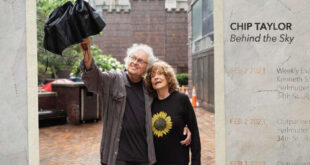The Momenta Quartet is known for adventurous programming, especially during its Momenta Festivals. These four-concert events include one program curated by each member of the quartet. A concert I attended in 2019 included music by György Ligeti and Harry Partch.
This year, the French horn was the star of violinist Alex Shiozaki’s segment of Momenta Festival VII.
Shiozaki named the program “Horn Fifths” after a simple progression of intervals that composers commonly used in the days of the French horn’s precursor, the natural horn, whose lack of valves left gaps in its harmonic range. David Byrd-Marrow is an extraordinary horn player with apparently no gaps whatsoever in his range. Two of the three pieces featured Byrd-Marrow, tying together old and new in an evening of versatile virtuosity and strange beauty.
In Memory of Philip K. Dick
The program began with a new piece by Japanese composer Hirofumi Mogi. “In Memory of Perky Pat,” a character piece inspired by a Philip K. Dick story, situates the French horn amid—and also in opposition to—the string quartet. It opens with an alarum from the muted horn that dissolves into chromatic dissonances and trendy portamentos. Anxious violin gestures and jumping pizzicato figures from the cello coax the mute out of the bell, and the ensemble rings forth a unison tonic.
No mood lasts in this piece, but the theme of opposition is consistent as the horn takes clear melodic lines while anxiety skitters through the strings.

There’s a remarkable ghostly sequence showing the quartet’s wonderful skill at high harmonics. The score also demands mastery of the horn’s full range at varying volumes and timbres requiring impressive breath and embouchure control. Byrd-Marrow delivered on all counts.
Moving tone clusters suggest a peaceful resolution to the story, while also looking back to the Romanticism represented by the other horn work on the program, Brahms’ Trio for Piano, Violin and Horn.
An Infusion of 20th-century Modernism
But first we heard a fine example of classic 20th-century modernism. Grażyna Bacewicz’s “Piano Quintet No. 2” from 1965 married traditional form with 12-tone thinking, pure abstraction, and blood-quickening passagework. In the first movement this mix produced emotionally rich textures and called forth some very tight ensemble playing.

The soulful, brilliantly constructed slow movement is built on a three-note close-chromatic motif that Bacewicz masterfully developed through artful marshaling of space and a variety of string techniques. Climbing tremolos in harmony were especially gripping in this enfolding performance.
Pianist Nana Shi led the dance in the bracing finale. A hint of a playful Debussy in the piano part contrasted with furious sawing from the violins, all woven around a four-note variation on the second-movement motif.
This was an altogether brilliant performance of a substantial piece from a composer nearing the end of her accomplished if too-short life, an artist who is not a household name in the United States. But how would the Momenta Quartet, known for the avant-garde, do with the Brahms?
Icy Finesse
Superbly, it turned out. Byrd-Marrow brought fine clarity of tone to the first movement of Brahms’ Trio for Piano, Violin and Horn, with its complex phrasing and counterpoint. He, Shi and Shiozaki blended warm strength with an icy finesse that worked surprisingly well with Brahms’ characteristic piano writing, which is lovely and graceful in a way that no one has ever matched. The Scherzo called for forceful virtuosity from the horn, while the trio explored the music’s surprising (for a Scherzo) depth with balance and sensitivity.
The Adagio features distinctive harmonic progressions that, again, only Brahms could have imagined. Here they were expressed with gentle clarity, the swells of emotion mournful yet hopeful. It’s amazing to think that Brahms wrote this life-affirming music in response to his mother’s death. I mourned that the movement was over so soon.
In the finale the horn returns to its formative role—in the hunt. I pictured hunters racing through the fields on well-groomed horses, with dogs out ahead enjoying every step. The Momenta Quartet’s ongoing hunt for exciting new music to play, along with seldom-heard modernist works and great classics, continues to breed winners—and unequivocal wins for audiences.
Momenta Festival VII is complete, but you can see the rest of the Momenta Quartet’s upcoming concert schedule at their website.
 Blogcritics The critical lens on today's culture & entertainment
Blogcritics The critical lens on today's culture & entertainment




